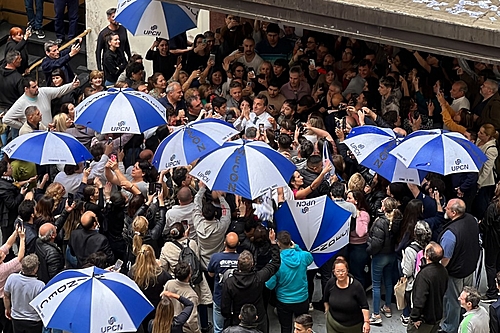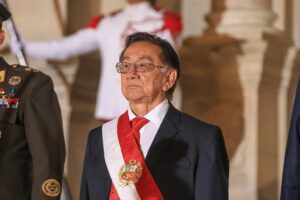
When the extreme right seemed to advance in Argentina and some analysts even predicted that it could take the presidential race in the first round, Peronism showed vigor and managed to halt its advance, at least for now.
In the first round of elections, held last Sunday (22), candidate Javier Milei (A Liberdade Avança), a big surprise in this election with his provocative far-right proposals, maintained the level of votes from the August primary elections: 30% ( 7,884,336 votes, with 98.5% of the ballots counted). But Sergio Massa (União pela Pátria, the coalition that currently governs the country), who had come in third place in the primaries, had substantial growth and finished in first place, with 36.6% of the votes (9,645,983).
:: Massa x Milei: what to expect from the second round in Argentina? ::
The two will compete in the second round on November 19, and the winner will assume the presidency on December 10 — Patricia Bullrich (Together for Change, right-wing, an alliance that led Mauricio Macri to the presidency in 2015) fell by the wayside, with 23.8 % of votes (6,267,152).
“The most important message from the polls is the stagnation of Milei’s electoral performance. The libertarian wave was abruptly interrupted, despite the acceleration of the social crisis offering fertile ground for exponential growth”, wrote this Monday (23) journalist Mario Santucho, editor of Crisis magazine, who drew two other conclusions from the election: the “awakening of the Peronist giant”, which achieved the “miracle of putting economic hardship on the back burner”, and the “failure of the Macrista party, which could lead to its disintegration, unable to understand the changes in the current dynamics of the political conflict” .
:: Peronism will have a larger legislative bench, but ultraliberals gain space and leave Congress more fragmented ::
Mass rises more than the dollar
“Pasta rises more than the dollar”, one of the countless memes that appeared on Sunday (22), summarizes the surprise caused by the good vote of the Peronist candidate. After all, he is the current Minister of Economy of a country that lives with 140% annual inflation, 40% poverty, a very devalued currency (the dollar was worth more than a thousand dollars on the parallel market on the eve of the election — and the Central Bank with reserves in the red.
Sergio Massa’s comeback took place, above all, in the cities that are on the outskirts of the capital Buenos Aires, a region that Argentines call “conurbano”, the most populous and poorest region in the country, the cradle of Peronism which accounts for 24% of the national electorate.
The governor of the province of Buenos Aires, Axel Kicillof, an ally of the former president (2007-2015) and current vice Cristina Kirchner, was re-elected on Sunday with 44.9%, an advantage of almost 20 percentage points over his opponents, a result which boosted Massa’s vote. In the two months since the primaries, Peronism received more than 2.5 million votes in the region.
Kicillof was the “great protagonist” of the elections, wrote Luis Bruschtein in the Argentine newspaper Page 12. In his opinion, the governor’s re-election is a consequence of hard work management in a challenging context, where the impact of the crisis was stronger. He sees in Kicillof a “versatile governor, who works close to the people, carrying out many public works and a lot of management”.
With an ally like this, Massa gains strength to fight Milei. “Society turned its back on those who proposed a country where the poor would have to sell their organs or their own children, where genocides would be glorified and the Falklands would be handed over; a system in which candidates use metaphors of perverse sexuality to reject sex education. This was not an ordinary election, because in addition to the economic problems, fundamental values of civilization were at stake”, says the writer.
:: Argentina: partial balance reveals greater voter participation than in the August caucuses ::
In search of the votes of the losers
But the second round is still missing, in which the balance will be Bullrich’s votes, but also the almost 1.8 million from Juan Schiaretti, a conservative anti-Kirchnerist Peronist, and the 710 thousand from Myriam Bregman, from the Trotskyist left.
“In principle, the majority of Bullrich’s votes go to Milei and those of Schiaretti and Bregman, to Massa, but it is difficult to know in what proportion”, says History professor Carlos Vidigal, a specialist in Argentina.
Bullrich, an implacable critic of the Peronists, also had strong clashes with Milei during the campaign. He even called her a “murderer” in reference to her past in Peronist youth, where she started in politics by fighting armed against the military dictatorship. And, in a critique of establishment politician as a whole, coined the term “the political caste”, through which he placed politicians from all parties in the same basket, accusing them of living off robbery.
“I’m here to put an end to the process of attacks and make a truce to put an end to Kirchnerism”, said Milei after the vote. “In addition to our differences, we have to understand that we have a criminal organization in front of us. Kirchnerism is the worst thing that happened to Argentina”, she added.
:: Sergio Massa, Peronist candidate, proposes a government of national unity and priority for workers in Argentina ::
Although Kirchnerism — a subgroup of Peronism linked to Cristina Kirchner — is a kind of common enemy and Milei and Bullrich’s electorates have points of ideological identification on the right, Macrism — a current linked to former president Macri — is heterogeneous. A considerable part of the electorate loyal to this group, which in the primaries supported Horacio Rodríguez Larreta as a candidate instead of Bullrich, identifies with social democracy and could vote for Massa.
“I want to speak to the thousands of radicals who share with us democratic values such as public education and the independence of powers. I will make every effort to gain their trust,” Massa said on election night. “Radicals” are the supporters of the Radical Civic Union, a historic party that is part of the Together for Change coalition.
Massa is expected to inherit a good part of the 710,000 votes from Myriam Bregman, from the Trotskyist left, and the question remains as to what the almost 1.8 million voters of Juan Schiaretti, a conservative anti-Kirchnerist Peronist, will do.
*With information from El País, Página 12 and a manifesto written by journalist Mario Santucho, from Crisis magazine.
Editing: Rodrigo Chagas

Source: www.brasildefato.com.br

